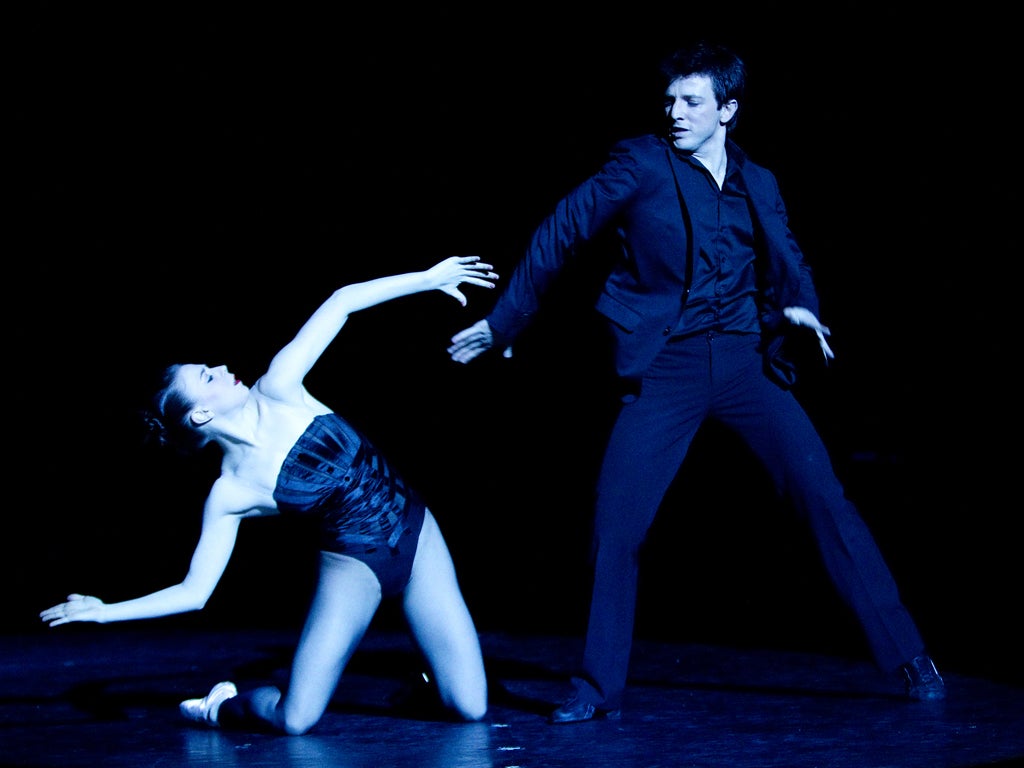La La La Human Steps, Sadler's Wells, London
Human physiology is tested to the limit in what you can only call extreme ballet, but at such speeds, the dancing misses the heart

While most people are familiar with the idea of extreme sports, extreme ballet sounds unlikely.
Yet there is no other way to describe the product of the Canadian Edouard Lock, whose blindingly fast assault on the once-demure art of dancing en pointe has kept his daffily named company La La La Human Steps in the spotlight for 30 years and counting.
Back at Sadler's Wells with a nameless new work celebrating that longevity, Lock and his team have lost none of their appetite for danger, with choreography that appears to challenge not only the limits of human physiology but also the most basic laws of physics. It's as if someone accidentally sat on the fast-forward button and stayed there for an hour and a half.
Mortals can't move that fast, surely? Yet there are no tricks, and you are forced to believe the evidence of your eyes. Lock has developed with his dancers a wired, flick-knife technique that allows them to shift through half a dozen positions in the blink of an eye, and keep on shifting, arms gesticulating in a blur like manic signers, shins operating like trip switches in an electric storm.
The more virtuosic improvisations in Argentine tango sometimes achieve effects like this, but they're spasmodic thrills, not the sustained modus operandi. What's more, every strobe-like sequence is as sharp as chiselled glass. No wonder the men look tense as they dodge their partners' flying limbs, wrench their speeding pirouettes into forward and reverse, or dive in to wrestle their spiky arabesques in and out of true. Every pas de deux becomes a fearsome tussle. And, spotlit in the dark, each streaking glimmer of bare arm or pale pink pointe shoe acts like summer lightning.
Excess has always been the defining quality of Lock's productions. This one is notionally themed on two Greek stories of thwarted love: Dido and Aeneas, and Orpheus and Eurydice, with co-composers Gavin Bryars and Blake Hargreaves sampling Purcell and Gluck's operas on those subjects. The results are channelled through a dynamic on-stage band of amplified piano, viola, cello and every size of saxophone, wielded with gusto.
At first, as is natural, you try to assemble some kind of narrative from the bits you vaguely recognise. But you soon find the task is hopeless, as much of the material seems to be accompaniment without the tune, and a mangled version of Purcell's Dido's lament comes midway through the evening, when no one looks remotely likely to expire.
Could the climactic duet between a desperate woman, lashing out in what might be anger or distress in the slippery grip of her black-clad partner, be a dim reference to Eurydice lashing out at fate as she tries to glimpse Orpheus in the Underworld? Such glimmers of story are too dim to amount to anything. Yet a theme does emerge when the non-stop frenzy of the dancing is periodically stilled by almost-static filmed images of two women projected on screens. One of the women is young, clear-eyed, determined not to be discomfited by the scrutiny of either the camera or the other woman. The other woman is a full generation older, with creases around her mouth and eyes that tell of a life well lived. And yet a shadow of disquiet hangs over her. As she glances across at the young woman, you fancy a trace of envy, perhaps tinged with pity or regret.
Not only is this tranquil portraiture a stark and necessary contrast to the general breathless frenzy. It's also an oblique commentary on the fleetingness of life, embodied in the dancers' maddened speed and spats that don't find resolution. Phenomenal as the dancing is, it lacks emotional engagement. That may be Edouard Lock's intention, but it leaves you feeling wrung out and slightly numb, rather than uplifted or enlightened.
Next Week:
Jenny Gilbert sees Akram Khan in what looks set to be his most personal work to date: Desh, a full-length solo inspired by his Bangladeshi roots
Dance Choice
London's annual Dance Umbrella season opens with a shower of riveting choreography by the late Merce Cunningham. This will be the last opportunity the UK public has to engage with Cunningham's work danced by the company he trained: it disbands later this year. Choose from three mixed bills at the Barbican Theatre (Wed to Sat).
Subscribe to Independent Premium to bookmark this article
Want to bookmark your favourite articles and stories to read or reference later? Start your Independent Premium subscription today.

Join our commenting forum
Join thought-provoking conversations, follow other Independent readers and see their replies